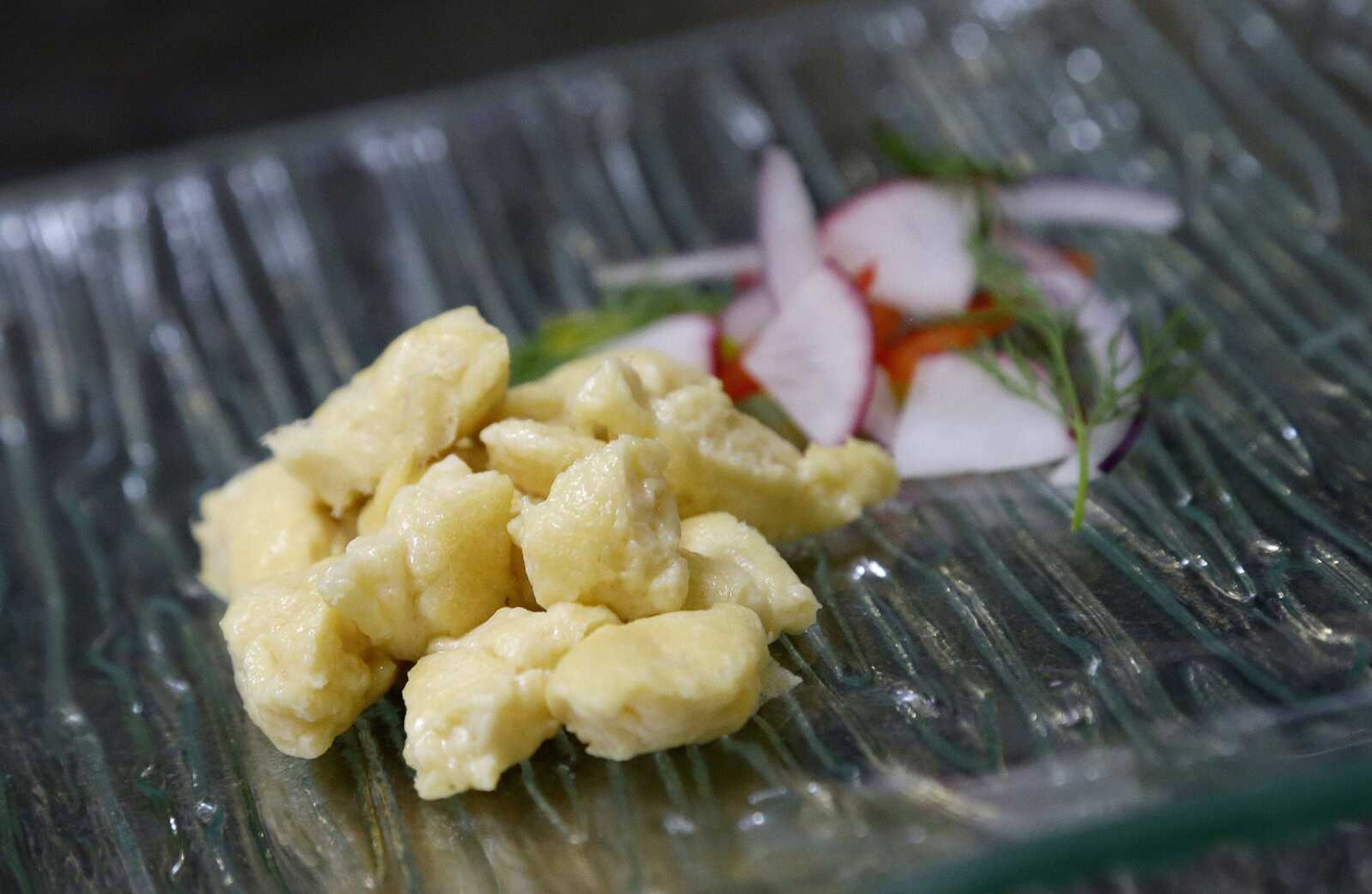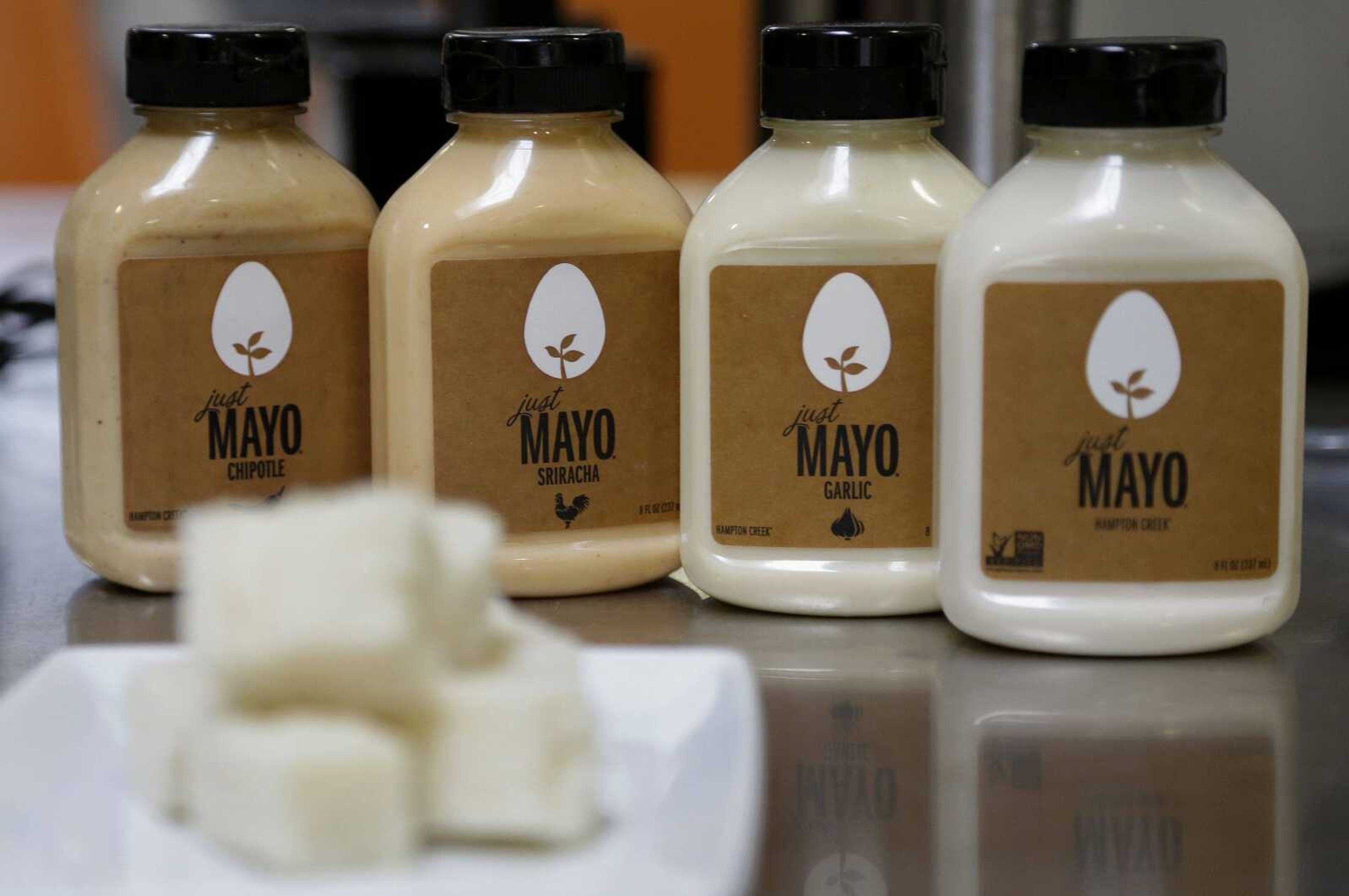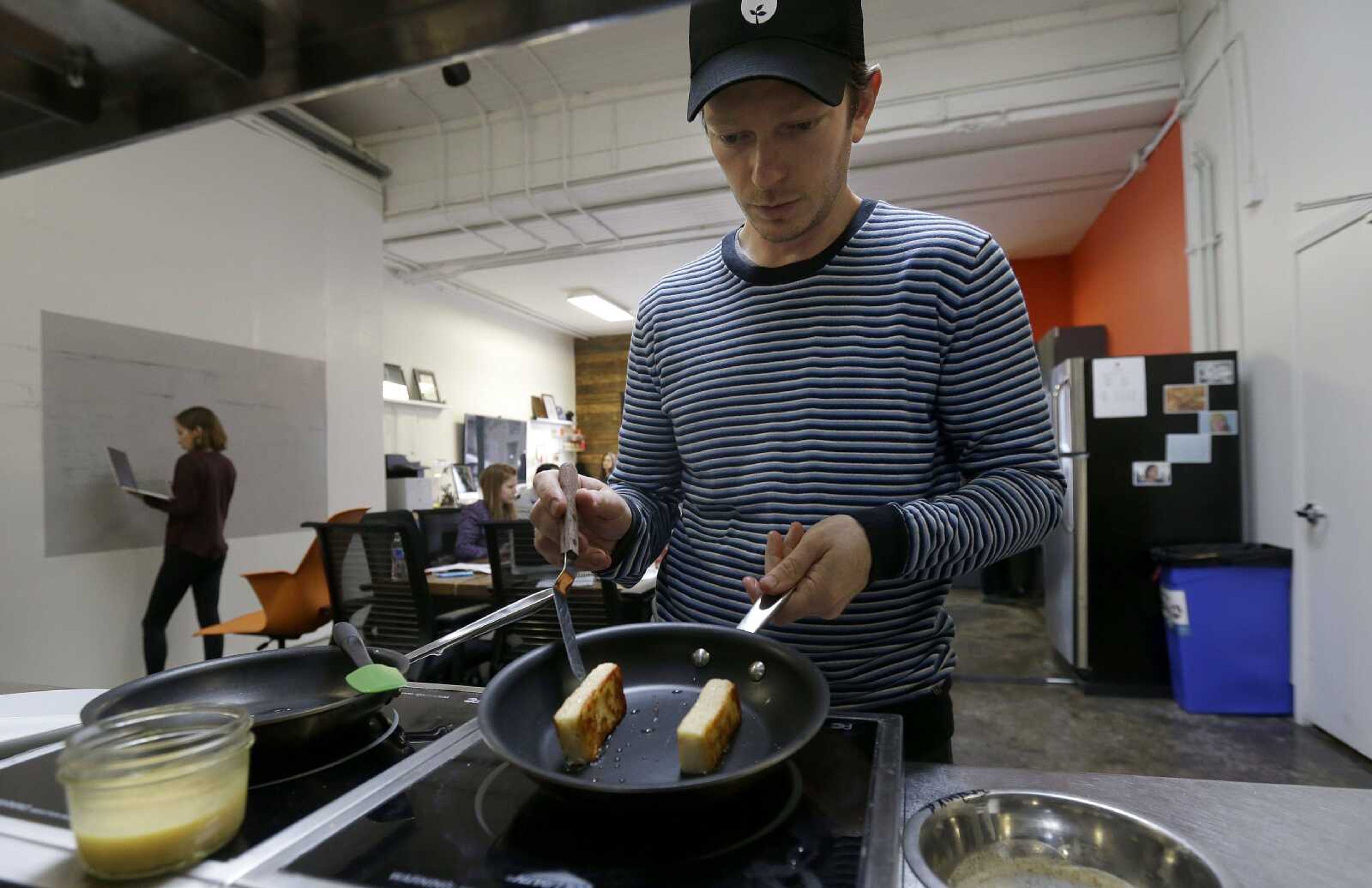Business notebook: Startup firms seek alternatives to meat
Patrick Brown is on an improbable mission: Make a burger Americans love, minus the meat. Veggie patties have been around for decades, but Brown and others want to make foods without animal products that look, cook and taste like the real thing -- and can appeal to the masses, the Associated Press reported...
This story has been edited from its original version to reflect the correct date for the ribbon cutting at Koehler Bookkeeping.
Patrick Brown is on an improbable mission: Make a burger Americans love, minus the meat.
Veggie patties have been around for decades, but Brown and others want to make foods without animal products that look, cook and taste like the real thing -- and can appeal to the masses, the Associated Press reported.
"We are not making a veggie burger. We're creating meat without using animals," said Brown, a former Stanford scientist who has been scanning plants in search of compounds that can help recreate meat.
Brown's company, Impossible Foods, is part of a wave of startups aiming to wean Americans off foods such as burgers and eggs, and their efforts are attracting tens of millions of dollars from investors. The goal is to lessen the dependence on livestock for food, which they said isn't as healthy, affordable or environmentally friendly as plant-based alternatives.

The challenge is most Americans happily eat meat and eggs. That means without a breakthrough, those seeking to upend factory farming risk becoming footnotes in the history of startups.
To understand the difficulty of their task, consider the transformation raw chicken undergoes when cooked. It starts as a slimy, unappetizing blob, then turns into a tender piece of meat.
In its office in Southern California, Beyond Meat works on "chicken" strips made with pea and soy proteins that have been sold at places such as Whole Foods since 2012. But founder Ethan Brown concedes the product needs work.
To give the "meat" its fat, for instance, canola oil is mixed evenly throughout the product.
"That's not really how it works in an animal," said Brown, a vegan. "The fat can be a sheath on tendons."

To form the strips, a mixture is pressed through a machine that forms and sets the product's texture with heating and cooling chambers. The method isn't new in the world of fake meats, but the company said it fine-tuned the process to deliver a more realistic offering.
Brown dismissed the idea fake meat might weird people out and said it's a "desirable evolution."
"It's like moving from the horse-drawn carriage to the automobile, or the landline to the iPhone," he said.
But Beyond Meat isn't there yet; The Huffington Post described the strips as having an "unpleasant" taste that inhabits a "strange territory between meat and vegetable."
At Impossible Foods, the patty is made by extracting proteins from foods such as spinach and beans, then combining them with other ingredients. The company, which has about 100 employees, expects the product to be available in the latter half of next year, initially through a food-service operator.
Few have tasted it, but the vision continues to gain traction. In October, Impossible Foods said it raised $108 million in funding, on top of its previous $74 million. Among its investors are Bill Gates, Google Ventures and Horizons Ventures.
Another startup isn't totally ditching the cow.
With $15.5 million in funding, Modern Meadow in New York City takes cells from a cow through a biopsy and cultures them to grow into meat. At a conference in February, company founder Andras Forgacs likened the process to culturing yogurt or brewing beer.
"This is an extension of that," he said.
Modern Meadow doesn't have a product on the market yet, either. The company said it doesn't necessarily want to replicate steaks and burgers, and it gave a hint of the type of foods it might make by presenting "steak chips" for attendees at a small conference last year.
In San Francisco, Hampton Creek's mission is to replace the eggs in products without anyone noticing. In trying to appeal to the mainstream, co-founder and CEO Josh Tetrick has a simple rule.
"Number one, never use the word 'vegan,'" he said.
To avoid perceptions its eggless spread Just Mayo won't taste good, Hampton Creek removed the V-word from the label. Tetrick said what makes the product different is it tastes better and costs less -- not that it's made with a protein from a Canadian yellow pea instead of eggs.
"The egg-free thing is almost irrelevant," he said.
Swapping out a single ingredient in a product may make it easier for people to swallow change. It also may make change simpler to achieve; Just Mayo's consistency and taste are similar to mayonnaise. The product, which is available at retailers including Target and Wal-Mart, is gaining enough traction, the American Egg Board, which is responsible for slogans such as the "Incredible, Edible Egg," sees it as a "major threat," according to emails made public through a records request.
So far, Hampton Creek has attracted $120 million in funding. It continues to screen plants for compounds that can help replace eggs in recipes and plans to introduce a scrambled-egg product eventually.
Sloan + Themis moving to new space
Sloan + Themis has announced it will move from its current location at 31 N. Main St. to the The Indie House, 605 Broadway. Sloan + Themis' space will be on the second floor of the building.
The move will be in progress until Thursday. During the transition, it will be open by appointment Monday through Saturday.
An open house is planned for Feb. 5 and 6.
Tax business opens in Benton
The Tax Team has opened at 22 Winchester St. in Benton, Missouri. Frank Ovanin and Tim Watkins merged with Rick Dohogne last year to form The Tax Team, according to a news release from The Tax Team.
Services provided by the firm include business and farm tax returns, establishment of LLCs, subchapter S corporations and partnerships and the required payroll and government reporting associated with such entities.
Appointments are available from 6:30 a.m. to 9 p.m. Monday through Saturday. Home visits also are available. To make an appointment, call (573) 313-9100 or email semotaxteam@gmail.com.
Scott County Farm Bureau gets award
The Scott County Farm Bureau received a special project award Dec. 7 during the 101st annual meeting of the Missouri Farm Bureau at Lake of the Ozarks, the Sikeston Standard Democrat reported. Scott County won for its Rural Crimes Committee to deter farm theft. Patrick Seyer, county vice-president, accepted the award for the county from Blake Hurst, Missouri Farm Bureau president. Only one special project award is presented in each of the organization's eight board districts, with each winning a $100 cash award.
Perryville man gets state ag award
Kurt Rehagen of Perryville, Missouri, recived the Missouri Agriculture Forestry Legacy Award on Dec. 18 during the Missouri Governor's Conference on Agriculture at Tan-Tar-A Resort in the Ozarks.
Rehagen is a second-generation sawmill owner who has grown his business through innovative domestic and international marketing, the Perryville Republic-Monitor reported.
Rehagen's business, Rustic Wood Products Inc., was established in 1972. He is past president of the Missouri Forest Products Association and has served on the executive committee for seven years. He also is one of only 14 Missouri Master Loggers.
Business licenses
- Everett Property Management, 536 Broadway, is a rental-property management business owned by Rocky Everett.
- American Family Insurance Michelle Wyatt Agency, 1021 Kingsway Drive, Suite 1, is an insurance-sales business owned by Michelle Wyatt; it was expected to open Jan. 1.
- J & S Sale LLC dba Golf Etc. Cape Girardeau, 1720 Kingsway Drive, No. 101, owned by Jamie and Sasha Jackson, sells and services golf equipment.
- Alliant RCM LLC, 1610 N. Kingshighway, No. 306, is a medical-billing services business owned by Mayson Capital Partners; it was expected to open Jan. 1.
- Alliant Services, 1610 N. Kingshighway, No. 306, is a management-services business owned by Mayson Capital Partners; it was expected to open Jan. 1.
- Hampton Inn, now open at 2070 S. Mount Auburn Road, is a hotel operated by Midamerica Hotels Corp.
Ribbon cuttings
- Kohler Bookkeeping, 412 S. Kingshighway in Cape Girardeau, will hold a ribbon cutting at 2 p.m. Thursday. An open house will follow until 4 p.m.
kwebster@semissourian.com
(573) 388-3642
Connect with the Southeast Missourian Newsroom:
For corrections to this story or other insights for the editor, click here. To submit a letter to the editor, click here. To learn about the Southeast Missourian’s AI Policy, click here.






